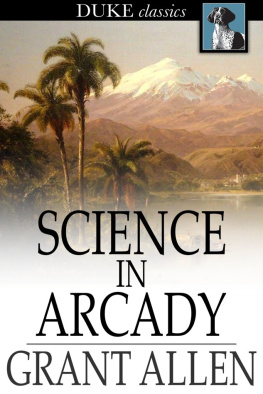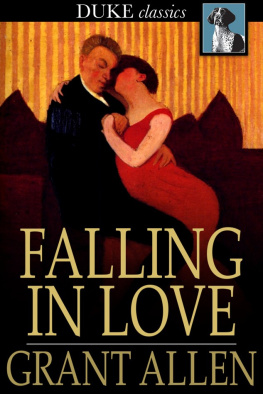Grant Allen - Science in Arcady
Here you can read online Grant Allen - Science in Arcady full text of the book (entire story) in english for free. Download pdf and epub, get meaning, cover and reviews about this ebook. year: 2014, publisher: Duke Classics, genre: Romance novel. Description of the work, (preface) as well as reviews are available. Best literature library LitArk.com created for fans of good reading and offers a wide selection of genres:
Romance novel
Science fiction
Adventure
Detective
Science
History
Home and family
Prose
Art
Politics
Computer
Non-fiction
Religion
Business
Children
Humor
Choose a favorite category and find really read worthwhile books. Enjoy immersion in the world of imagination, feel the emotions of the characters or learn something new for yourself, make an fascinating discovery.
- Book:Science in Arcady
- Author:
- Publisher:Duke Classics
- Genre:
- Year:2014
- Rating:3 / 5
- Favourites:Add to favourites
- Your mark:
- 60
- 1
- 2
- 3
- 4
- 5
Science in Arcady: summary, description and annotation
We offer to read an annotation, description, summary or preface (depends on what the author of the book "Science in Arcady" wrote himself). If you haven't found the necessary information about the book — write in the comments, we will try to find it.
Canadian author Grant Allen dabbled in a vast number of literary genres over the course of his career, and of all of his published work, perhaps none more accurately depicts his unique talents than Science in Arcady. This delightful essay collection touches on a number of topics, but many of the pieces are tied together with themes of travel and science.
Science in Arcady — read online for free the complete book (whole text) full work
Below is the text of the book, divided by pages. System saving the place of the last page read, allows you to conveniently read the book "Science in Arcady" online for free, without having to search again every time where you left off. Put a bookmark, and you can go to the page where you finished reading at any time.
Font size:
Interval:
Bookmark:

First published in 1892
ISBN 978-1-63421-135-2
Duke Classics
2014 Duke Classics and its licensors. All rights reserved.
While every effort has been used to ensure the accuracy and reliability of the information contained in this edition, Duke Classics does not assume liability or responsibility for any errors or omissions in this book. Duke Classics does not accept responsibility for loss suffered as a result of reliance upon the accuracy or currency of information contained in this book.
To GRANT RICHARDS,
IN GRATEFUL ACKNOWLEDGMENT OF MANY KIND OFFICES.
These essays deal for the most part with Science in Arcady. 'Tis mynative country: for I am not of those who 'praise the busy town.' Onthe contrary, in the words of the great poet who has just departed tojoin Milton and Shelley in a place of high collateral glory, I 'love torail against it still,' with a naturalist's bitterness. For the town isalways dead and lifeless. There are who admire it, they saypoorpurblind creaturesbecause, forsooth, 'there is so much life there.'So much life, indeed! No grass in the streets; no flowers in the lanes;no beetles or butterflies on the dull stone pavements! Brick and mortarhave killed out all life over square miles of Middlesex. For myself, Ilove better the densely-peopled fields than this human desert, thisbeflagged and macadamised man-made solitude. The country teems withlife on every hand; a thousand different plants and flowers in thespangled meadows; a thousand varied denizens of pond, and air, andheath, and copses. Their ways are endless. They attract me far morewith their infinite diversity than the grey and gloomy haunts of thecab-horse and the stock-broker.
But my Arcady, as you will see, is none the less tolerably broad andeclectic in its limits. These various essays have been suggested to mypen by rambles far and wide between its elastic confines. The littletractate on Mud, for example, recalls to mind some pleasant weeksamong the Italian lakes and on the plain of Lombardy. A Desert Fruitowes its origin to a morning at Luxor. High Life had its key-notestruck by a fortnight in the Tyrol. Tropical Education is a dimreminiscence of old Jamaican experiences. Our Eight-Legged Friendswere observed at leisure on the window-panes of our own little nook atDorking. A Hill-Top Stronghold was sketched in situ at Florence bya window that looked across the valley to Fiesole. Excursions intobooks or into the remoter past have given occasion for thearchological essays relegated here to the end of the volume.
My thanks are due to Messrs. Longmans for permission to reprint fromtheir magazine My Islands, A Hill-Top Stronghold, A Desert Fruit,The Isle of Ruim, Eight-Legged Friends, and Tropical Education. Ihave also to acknowledge a similar courtesy on the part of Messrs.Smith & Elder with regard to Mud, The Bronze Axe, High Life,Pretty Poll, The Greenwood Tree, On the Wings of the Wind,Casters and Chesters, and Fish as Fathers, all of which originallyappeared in the Cornhill. Messrs. Chatto & Windus have been equallykind as regards the paper on An English Shire contributed to theGentleman's. A Persistent Nationality made its first bow in theNorth American Review, and has still to be introduced to an Englishaudience.
G.A.
Hind Head, Surrey, Oct., 1892.
About the middle of the Miocene period, as well as I can now remember(for I made no note of the precise date at the moment), my islandsfirst appeared above the stormy sheet of the North-West Atlantic as alittle rising group of mountain tops, capping a broad boss of submarinevolcanoes. My attention was originally called to the new archipelago bya brother investigator of my own aerial race, who pointed out to me onthe wing that at a spot some 900 miles to the west of the Portuguesecoast, just opposite the place where your mushroom city of Lisbon nowstands, the water of the ocean, as seen in a bird's-eye view from somethree thousand feet above, formed a distinct greenish patch such asalways betokens shoals or rising ground at the bottom. Flying out atonce to the point he indicated, and poising myself above it on my broadpinions at a giddy altitude, I saw at a glance that my friend was quiteright. Land making was in progress. A volcanic upheaval was takingplace on the bed of the sea. A new island group was being forced rightup by lateral pressure or internal energies from a depth of at leasttwo thousand fathoms.
I had always had a great liking for the study of material plants andanimals, and I was so much interested in the occurrence of this novelphenomenonthe growth and development of an oceanic island before myvery eyesthat I determined to devote the next few thousand centuriesor so of my onian existence to watching the course of its gradualevolution.
If I trusted to unaided memory, however, for my dates and facts, Imight perhaps at this distance of time be uncertain whether the momentwas really what I have roughly given, within a geological age or two,the period of the Mid-Miocene. But existing remains on one of theislands constituting my group (now called in your new-fangledterminology Santa Maria) help me to fix with comparative certainty theprecise epoch of their original upheaval. For these remains, still inevidence on the spot, consist of a few small marine deposits of UpperMiocene age; and I recollect distinctly that after the main group hadbeen for some time raised above the surface of the ocean, and aftersand and streams had formed a small sedimentary deposit containingUpper Miocene fossils beneath the shoal water surrounding the maingroup, a slight change of level occurred, during which this minorisland was pushed up with the Miocene deposits on its shoulders, as asort of natural memorandum to assist my random scientificrecollections. With that solitary exception, however, the entire groupremains essentially volcanic in its composition, exactly as it was whenI first saw its youthful craters and its red-hot ash-cones pushedgradually up, century after century, from the deep blue waters of theMid-Miocene ocean.
All round my islands the Atlantic then, as now, had a depth, as I saidbefore, of two thousand fathoms; indeed, in some parts between thegroup and Portugal the plummet of your human navigators finds nobottom, I have often heard them say, till it reaches 2,500; and out ofthis profound sea-bed the volcanic energies pushed up my islands as asmall submarine mountain range, whose topmost summits alone stood outbit by bit above the level of the surrounding sea. One of them, themost abrupt and cone-like, by name now Pico, rises to this day, amagnificent sight, sheer seven thousand feet into the sky from theplacid sheet that girds it round on every side. You creatures ofto-day, approaching it in one of your clumsy new-fashioned fire-drivencanoes that you call steamers, must admire immensely its conical peak,as it stands out silhouetted against the glowing horizon in the deepred glare of a sub-tropical Atlantic sunset.
But when I, from my solitary aerial perch, saw my islands rise bare andmassive first from the water's edge, the earliest idea that occurred tome as an investigator of nature was simply this: how will they ever getclad with soil and herbage and living creatures? So naked and barrenwere their black crags and rocks of volcanic slag, that I could hardlyconceive how they could ever come to resemble the other smiling oceanicislands which I looked down upon in my flight from day to day over somany wide and scattered oceans. I set myself to watch, accordingly,whence they would derive the first seeds of life, and what changeswould take place under dint of time upon their desolate surface.
Font size:
Interval:
Bookmark:
Similar books «Science in Arcady»
Look at similar books to Science in Arcady. We have selected literature similar in name and meaning in the hope of providing readers with more options to find new, interesting, not yet read works.
Discussion, reviews of the book Science in Arcady and just readers' own opinions. Leave your comments, write what you think about the work, its meaning or the main characters. Specify what exactly you liked and what you didn't like, and why you think so.












